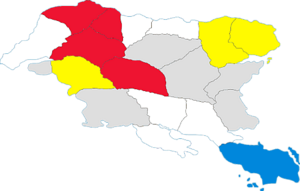Gylian federal election, 2000
| |||||||||||||||||||||||||||||||||||||||||||||||||
All 500 seats in the Chamber of Deputies 251 Chamber of Deputies seats seats needed for a majority | |||||||||||||||||||||||||||||||||||||||||||||||||
|---|---|---|---|---|---|---|---|---|---|---|---|---|---|---|---|---|---|---|---|---|---|---|---|---|---|---|---|---|---|---|---|---|---|---|---|---|---|---|---|---|---|---|---|---|---|---|---|---|---|
| Turnout | 94,8% | ||||||||||||||||||||||||||||||||||||||||||||||||
| |||||||||||||||||||||||||||||||||||||||||||||||||
 | |||||||||||||||||||||||||||||||||||||||||||||||||
| |||||||||||||||||||||||||||||||||||||||||||||||||
Federal elections were held in Gylias on 22 January 2000, to elect the 500 members of the Chamber of Deputies. They were the first elections since 1962 to exclude the Senate, after it was reformed to a sortition-based model.
The incumbent Mathilde Vieira government was re-elected with minor changes in seats. One of the notable results was the National Bloc displacing the New Alliance for the Future from its third place finishes of the 1990s, raising hopes that the conservatives were recovering from the setbacks of the previous decade.
Electoral system
The Chamber of Deputies was elected through single transferable vote, using the Droop quota and 5-member circonscriptions, drawn by Elections Gylias based on regional populations.
Parties were not allowed to nominate more than one candidate per seat. Candidates were not allowed to serve in the Senate simultaneously.
Parties
Background
The 1990s had been a decade of renewed national optimism and self-confidence in Gylias after the wretched decade, marked by economic rejuvenation, major reforms such as the Social Partnership Program and Aishwarya Devi's reduction of consumption, rebuilt foreign ties, and a renewed Gylian Invasion.
All these factors put the Mathilde Vieira government into an unassailable position heading into the election, with a further advantage coming from Mathilde Vieira's skill at navigating the "liquid Parliament".
Following the successful 1997 referendum that reformed the Senate to be based on sortition, this was the first federal election held only for the Chamber of Deputies.
This was the also first federal election contested by the last major "molehill party", the People's Party for a Flourishing Nightlife. Established in response to the Law on Night Sky Protection of 1995, the PPFN took a left-wing demopolitan stance, performing very well in the 1996 and 1998 municipal elections. The party benefited significantly from its association with the Neo-Gylian Sound scene, and Readymade Records in particular, similar to the widespread pop culture support that the LSD Party and Love, Nature, Democracy had attracted at their founding.
The recently-founded Pirate Party enjoyed a high profile, and there was much excitement as they contested their first election.
Campaign
The Mathilde Vieira government largely reprised its campaign strategy from the previous election. Ŋéida Vaşad commented that there was a subtle shift, however, from the purely centre ground positioning of before towards a more centre-left emphasis.
The National Bloc hoped for a turnaround in its fortunes by choosing former Governor of Nauras Eiko Fujimura as its foresitter. Eiko's green conservative campaign and appealing image proved very helpful for the NB.
Results
In accordance with electoral law, the results were embargoed until the full counting and transfers were completed, and were released all at once on 25 January.
| Parties and blocs | Chamber of Deputies | |||||
|---|---|---|---|---|---|---|
| FPV | % | ± | Seats | ± | ||
| Non-inscrits and independents | 2.799.367 | 23,0% | 236 | |||
| Liberal Union | 2.495.088 | 20,5% | 70 | |||
| Progressive Alliance | 2.482.917 | 20,4% | 68 | |||
| National Bloc | 2.434.233 | 20,0% | 64 | |||
| Centre Group | 1.728.305 | 14,2% | 60 | |||
| Union for Freedom and Prosperity | 133.883 | 1,1% | 2 | |||
| Revolutionary Rally | 73.027 | 0,6% | 0 | |||
| Front for Renewal of Order and Society | 24.342 | 0,2% | 0 | |||
| Total | 12.171.163 | 100% | — | 500 | — | |
| Registered voters and turnout | 12.963.226 | 94,8% | ||||
Analysis
The overall results showed a mixed trend by comparison to 1995. The Non-inscrits' 2,1% decline in first preference votes led some commentators to speculate that the wave that had sustained them in the 1990s was beginning to ebb. The Progressive Alliance and National Bloc recorded slightly larger gains in first preference votes, slightly over 1%, but these translated into minor seat gains. The Liberal Union and Centre Group vote largely held steady.
The non-inscrits' plurality of first preference votes and seats remained well-entrenched. The New Alliance for the Future, having previously finished in third place overall in 1990 and 1995, was displaced by the National Bloc, even though it only lost 3 seats. The NB's third-place finish proved encouraging for Eiko's leadership, although the total gains for the NB–CG alignment remained a meager 9 deputies.
The small degree of change was reflected regionally, with 10 regions returning the same pluralities as the previous election. The number of tied regions decreased to 6, although Ḑarna and Nauras went from NB pluralities to tied. The Progressive Alliance managed to gain pluralities in Salxar and Makarces, while failing to overturn the ties in the other mountainous regions. Envadra returned a non-inscrit plurality, while the NB managed to regain a plurality in Nerveiík-Iárus-Daláyk.
Aftermath
The new Parliament was sworn in on 1 February 2000, and the Mathilde Vieira government was returned to office.



